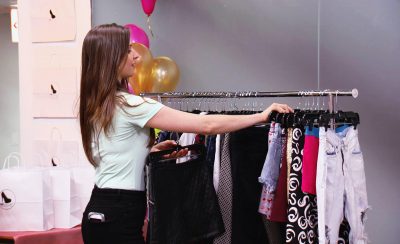
Alexandra Shadrow, who graduated from Boston University’s College of Communication in 2015, has created a business at age 23, and it is growing. Shadrow founded UNItiques out of her BU dorm during her junior year. UNItiques is the first college marketplace for students to buy and sell fashion and other goods, according to the business’ website.
They recently opened new headquarters in The BUzzLab, BU’s center for entrepreneurship, and will be hosting a pop-up shop this Wednesday to break in the new space, said Hilary Fan, a sophomore at Suffolk University and regional director of UNItiques Boston.
“It’s really awesome because it’s the central home for all our Boston [representatives],” Shadrow said.
She explained that working in the BUzzLab gives her team access to an abundance of resources and allows them to collaborate with other entrepreneurs. Along with displaying several new styles and fashion for upcoming events such as BU’s sorority recruitment weekend, UNItiques will also utilize their environment by giving pop-up shoppers information about various internships affiliated with the BUzzLab community.
“We’re having it be like an open house for internships as well,” Shadrow said. “If you’re not a great fit for the UNItiques internship, we’ll keep you on a list of people for other internships that are going on in the BUzzLab.”
The pop-up shop draws inspiration from a previous experience.
In 2016, UNItiques was featured on “Project Runway: Fashion Startup.” The competition series spinoff offers aspiring fashion entrepreneurs the opportunity to pitch their business proposal to a panel of successful industry experts in a “Shark Tank”-esque manner.
If the panel sees potential in the budding idea, they offer the entrepreneur a “test to invest” to see how the company would function in the field, Shadrow said. For UNItique’s “test to invest,” Shadrow hosted a pop-up shop that mirrors Wednesday’s upcoming event.
It was during this pop-up shop that designer Rebecca Minkoff offered to purchase 30 percent of Shadrow’s company and transform Shadrow’s startup company into the emerging triumph that it is quickly becoming. Currently, UNItiques has approximately $200,000 in member sales, Shadrow said.
Shadrow described her experience working with Minkoff as “beautiful” and said she feels extremely fortunate to be “validated by somebody as successful as [Minkoff].”
The pop-up shop will take place from noon until 4 p.m. in the BUzz Lab on Bay State Road, Fan said. It will be set up like a small boutique, with one to two racks of hanging and folded popular clothing.
“We try to showcase the best few items from each college girls’ closets,” Fan said.
Fan explained that while UNItiques is breaking into other industries and is beginning to feature other goods on their website such as technology and furniture, the pop-up shop will only showcase clothes that members can drop off.
The pop-up shop will attempt to emphasize UNItiques’ mission to support young college women. As UNItiques was created in light of a rather uncomfortable online shopping situation that Shadrow faced, the pop-up shop will educate young college men and women on how to safely buy and sell goods online through UNItiques.
Jamie Weber, a freshman in BU’s School of Hospitality Administration, explained her excitement for the upcoming housewarming party.
“I love being able to share my fashion with my friends and people from other schools without leaving my dorm,” Weber said. “I can’t wait for Wednesday’s pop-up shop to learn more about the company.”
Shadrow said she has been able to overcome the hindrances of youth and prove herself and her team in such a competitive industry. According to an interview Shadrow gave to NASDAQ at TechDay Los Angeles, UNItiques grows in membership by 1,000 every month, as of September 2016.
Since then, UNItique’s membership has increased by over 2,000 sellers and buyers. With this in mind, Shadrow also talked about her experience being a young entrepreneur in a world of experienced, seasoned businessmen and women.
“It took a lot of maturity at a young age to be like, ‘Okay, how do I actually manage people that know more than I do?’”














